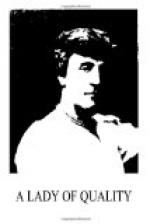’Twas in these days Sir Jeoffry came to his end, it being in such way as had been often prophesied; and when this final hour came, there was but one who could give him comfort, and this was the daughter whose youth he had led with such careless evilness to harm.
If he had wondered at her when she had been my Lady Dunstanwolde, as her Grace of Osmonde he regarded her with heavy awe. Never had she been able to lead him to visit her at her house in town or at any other which was her home. “’Tis all too grand for me, your Grace,” he would say; “I am a country yokel, and have hunted and drank, and lived too hard to look well among town gentlemen. I must be drunk at dinner, and when I am in liquor I am no ornament to a duchess’s drawing-room. But what a woman you have grown,” he would say, staring at her and shaking his head. “Each time I clap eyes on you ’tis to marvel at you, remembering what a baggage you were, and how you kept from slipping by the way. There was Jack Oxon, now,” he added one day—“after you married Dunstanwolde, I heard a pretty tale of Jack—that he had made a wager among his friends in town—he was a braggart devil, Jack—that he would have you, though you were so scornful; and knowing him to be a liar, his fellows said that unless he could bring back a raven lock six feet long to show them, he had lost his bet, for they would believe no other proof. And finely they scoffed at him when he came back saying that he had had one, but had hid it away for safety when he was drunk, and could not find it again. They so flouted and jeered at him that swords were drawn, and blood as well. But though he was a beauty and a crafty rake-hell fellow, you were too sharp for him. Had you not had so shrewd a wit and strong a will, you would not have been the greatest duchess in England, Clo, as well as the finest woman.”
“Nay,” she answered—“in those days—nay, let us not speak of them! I would blot them out—out.”
As time went by, and the years spent in drink and debauchery began to tell even on the big, strong body which should have served any other man bravely long past his threescore and ten, Sir Jeoffry drank harder and lived more wildly, sometimes being driven desperate by dulness, his coarse pleasures having lost their potency.
“Liquor is not as strong as it once was,” he used to grumble, “and there are fewer things to stir a man to frolic. Lord, what roaring days and nights a man could have thirty years ago.”
So in his efforts to emulate such nights and days, he plunged deeper and deeper into new orgies; and one night, after a heavy day’s hunting, sitting at the head of his table with his old companions, he suddenly leaned forward, staring with starting eyes at an empty chair in a dark corner. His face grew purple, and he gasped and gurgled.
“What is’t, Jeoff?” old Eldershawe cried, touching his shoulder with a shaking hand. “What’s the man staring at, as if he had gone mad?”




